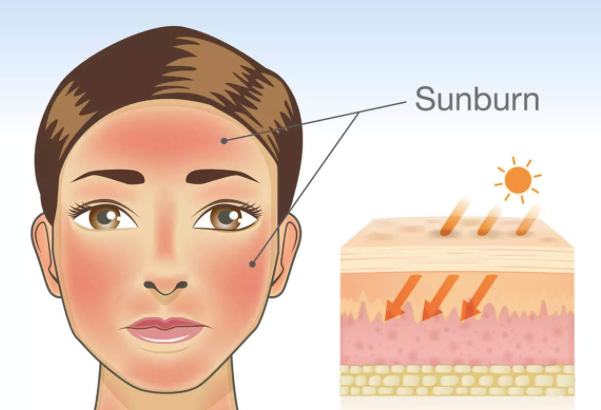Sunburn is a type of skin damage that occurs when the skin is exposed to too much ultraviolet (UV) radiation from the sun or other sources such as tanning beds. When the skin is exposed to UV radiation, it produces more melanin, which is the pigment that gives skin its color, as a protective response. However, if the exposure is excessive, the skin can become inflamed and irritated, resulting in sunburn.
The symptoms of sunburn typically include redness, pain, swelling, and in severe cases, blistering and peeling of the skin. Sunburn can also lead to long-term damage to the skin, such as premature aging and an increased risk of skin cancer.

To prevent sunburn, it’s important to limit your exposure to the sun during peak hours, wear protective clothing, and use a sunscreen with a high SPF. If you do get sunburned, you can treat it by staying hydrated, using cool compresses, taking anti-inflammatory medication, and applying topical treatments such as aloe vera gel or hydrocortisone cream. It’s also important to avoid further sun exposure until the sunburn has healed.
Sun rash, also known as polymorphous light eruption (PMLE), is a type of rash that appears on the skin after exposure to sunlight. To reduce sun rash, here are some steps you can take:
Avoid direct sunlight: The best way to prevent sun rash is to avoid exposure to the sun during peak hours, which are typically between 10 a.m. and 4 p.m.
Wear protective clothing: When you are exposed to sunlight, wear protective clothing such as long-sleeved shirts, pants, and hats to cover your skin. Choose fabrics that are lightweight, breathable, and tightly woven.
Apply sunscreen: Use a sunscreen with a high SPF of 30 or higher, which will help protect your skin from the harmful UV rays of the sun. Apply it liberally and often, especially if you are swimming or sweating.
Stay hydrated: Drink plenty of water to keep your skin hydrated and healthy.
Take anti-inflammatory medication: If you have a sun rash, taking over-the-counter anti-inflammatory medication such as ibuprofen or aspirin may help reduce inflammation and relieve pain.
Use topical treatments: There are various topical treatments available that can help reduce sun rash symptoms, such as hydrocortisone cream or aloe vera gel. If your sun rash persists or is severe, it is best to consult a healthcare professional for further advice and treatment.


